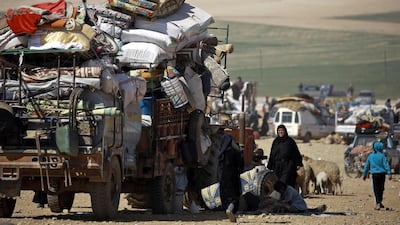BEIRUT // The complexities of Syria’s war and the contrasting goals of its domestic and foreign belligerents are becoming increasingly clear, especially around the town of Manbij, east of Aleppo.
Not only are Syrian government and rebel forces there, but also Turkish, Russian, American and Kurdish troops.
While they are all ostensibly fighting to dislodge ISIL from north-eastern Syria, some are longtime allies, while others are sworn enemies, temporary bedfellows or suspicious confederates.
As their front lines, loyalties and animosities collide, they run the risk of sending anti-ISIL operations awry and further complicating the war.
Manbij has been controlled by the opposition Syrian Democratic Forces since they captured the area from ISIL in August last year. The SDF is the United States’ chief ally on the ground and is dominated by the Kurdish YPG militia, a group Turkey considers a terrorist organisation for its ties to the Kurdistan Workers’ Party.
As Turkey made it clear that its rebel proxies would move on Manbij to remove the Kurds, the SDF began fearing the consequences of a major battle for the city. To dissuade Turkey from attacking, the SDF began handing villages around Manbij back to the Syrian government, hoping to create a buffer zone.
Although Turkey has spent years trying to unseat the regime of Bashar Al Assad by funnelling arms to rebel groups, Ankara and its proxies have avoided combat with government forces since the Turkish military intervention last year, focusing on the pursuit of ISIL and the YPG. The Syrian regime has, so far, returned the favour.
Now the US, an ally of Turkey that relies on its Incirlik air base, has also inserted its troops between Turkish forces and the SDF. In recent days, the usually low-profile US special forces in Syria made an overt show of force by riding into Manbij in armoured vehicles bearing American flags. They were essentially setting themselves up as a buffer to stop their two allies against ISIL from attacking each other.
In a strange twist to the war, US troops now find themselves protecting the SDF in Manbij alongside the Syrian government and its ally Russia – whom Washington has opposed and condemned throughout the war.
The Manbij deployment comes as the US broadens its involvement in Syria. On Thursday, US officials said about 400 Marines and Army Rangers had arrived in Syria to support the attack on Raqqa with non-frontline roles. Previously, about 500 special forces soldiers were deployed in Syria.
The boost in conventional ground forces was followed by news that the Trump administration was considering deploying 1,000 “reserve” forces to Kuwait to support the fight against ISIL in Iraq and Syria.
However, Washington has still not divulged a clear policy on Syria. President Donald Trump has been vague about his plans, and has suggested the US could work with Russia. And Syria’s president has at times suggested his country could work with the Trump administration.
Mr Trump has also said the US would create “safe zones” in Syria to protect civilians – a move that is unlikely to be welcomed by Russia or the Syrian government and would require even more US military involvement.
The deployment of US special forces to Manbij and the arrival of conventional forces elsewhere in YPG territory go against Ankara’s hopes that he would reverse support for the YPG.
Turkey has repeatedly asked Washington to pick between its allies. Now, the situation at Manbij and Turkey and the SDF’s insistence that the other be barred from the offensive to retake Raqqa could finally deliver some kind of response.
jwood@thenational.ae
* with additional reporting from Reuters

